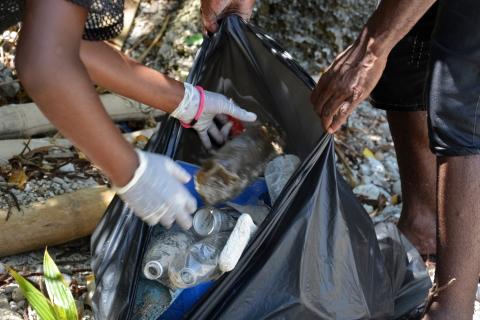Twenty Nations Call for a Strong Global Agreement on Plastic Pollution

FOR IMMEDIATE RELEASE
In a welcome development, twenty countries led by Norway and Rwanda yesterday announced a coalition to end plastic pollution and work together to help forge an effective, meaningful global Plastics Treaty. According to their press release, The High Ambition Coalition to End Plastic Pollution “will issue statements and undertake intersessional work on essential elements and issues to inform the negotiations in order to develop a landmark treaty by 2024.” UNEA has mandated a Plastics Treaty based on a comprehensive approach that addresses the full lifecycle of plastic, and, among other provisions, calls for an agreement “To promote sustainable production and consumption of plastics, including, among others, product design, and environmentally sound waste management, including through resource efficiency and circular economy approaches.”
IPEN has called for a strong, meaningful global agreement to end plastic pollution that eliminates the toxic impacts of plastics and chemicals, based on the precautionary principle, and protects the health of citizens, workers, vulnerable populations and Indigenous Peoples, and the environment. Ending the toxic impacts of plastics will require addressing all aspects of plastic production, use, transport, and disposal, with a focus on reduction and minimization of plastic production.
“Norway and Rwanda and their coalition partners are establishing an important effort to bring the health and environmental threats from chemicals in plastics directly to the table in the Plastics Treaty negotiations,” said Vito Buonsante, IPEN Policy & Technical Advisor. “It is promising that the High Ambition Coalition is aiming to end plastic pollution by 2040. More than 10,000 different chemicals are used in plastics, including chemicals that can cause cancer and chemicals linked to infertility and reproductive health conditions. To protect human health and the environment from the harmful effects of plastics it is crucial that efforts to reduce plastic pollution are coupled with decisive actions toward eliminating toxic chemicals in plastics.”
According to recent scientific evidence, the global threat of plastic and chemical production has exceeded the “planetary boundaries” for chemical pollution, meaning that production and emissions are threatening the stability of the entire global ecosystem. Industry is aiming to increase plastic production by 400% by 2050 while the chemical additives market will expand in a similar way in the same period. Estimates suggest that 25-50 percent of the increase will be due to demand for oil for petrochemicals.
“Industry’s plan to ramp up plastics production will inevitably mean more plastics dumped in Africa, and more toxic chemicals in the environment,” said Griffins Ochieng, IPEN Plastics Workgroup co-chair and Executive Director of CEJAD (Centre for Environment Justice and Development) in Kenya. “While we are not major plastics producers, waste plastics with toxic chemicals end up on Africa’s shores and pollute our communities, without our consent. A global agreement must aim to stop toxic plastic waste exports and hold producers accountable for the environmental injustices that their products create.”
“In Alaska and throughout the Arctic, we face health threats both as a hemispheric sink for chemicals from plastics and as a final dumping ground for plastic pollution. The waters of the Arctic Ocean now contain the most plastics of any ocean on the planet,” said Pam Miller, IPEN Co-Chair and Executive Director of Alaska Community Action on Toxics. “Our residents and especially Arctic Indigenous Peoples urgently need a Plastics Treaty that protects health and the environment from these toxic assaults.”
The IPEN Plastics Treaty Platform echoes some of the key deliverables expressed by the High Ambition Coalition, including its intent to:
- Eliminate problematic plastics, including by bans and restrictions.
- Develop global sustainability criteria and standards for plastics
- Set global baselines and targets for sustainability throughout the lifecycle of plastics.
- Ensure transparency in the value chain of plastics, including for material and chemical composition.
- Establish mechanisms for strengthening commitments, targets and controls over time.
- Implement monitoring and reporting at each stage through the lifecycle of plastics.
- Facilitate effective technical and financial assistance, scientific and socio-economic assessments.
For more information, see IPEN’s work Toward a Plastics Treaty.
See the High Ambition Coalition statement on their website.
IPEN is a global network forging a healthier world where people and the environment are no longer harmed by the production, use, and disposal of toxic chemicals. Over 600 public interest organizations in over 125 countries, largely low- and middle-income nations, comprise IPEN and work to strengthen global and national chemicals and waste policies, contribute to ground-breaking research, and build a global movement for a toxics-free future.
